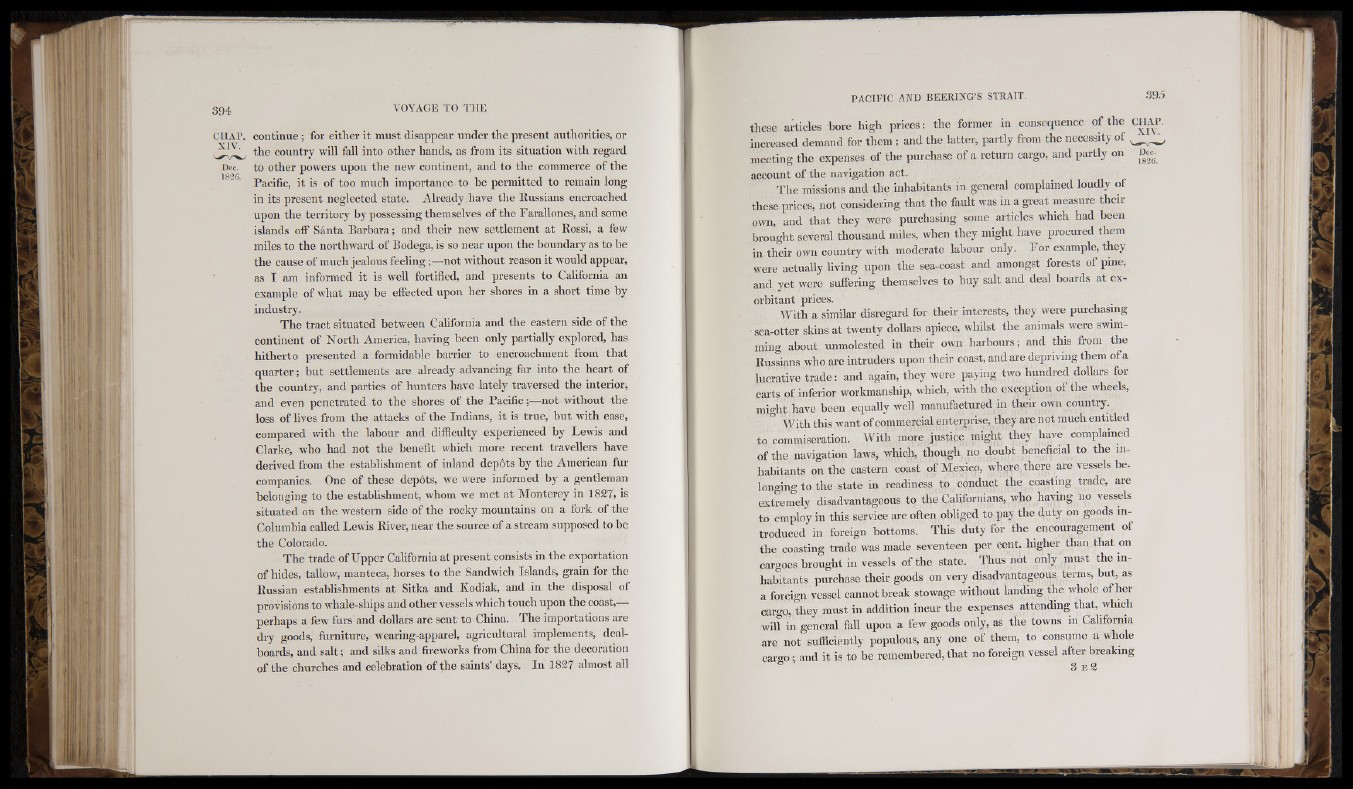
continue ; for either it must disappear under the present authorities, or
the country will fall into other hands, as from its situation with regard
to other powers upon the new continent, and to the commerce of tlie
Pacific, it is of too much importance to be permitted to remain long
in its present neglected state. Already have the Russians encroached
upon the territory by possessing themselves of the Farallones, and some
islands off Sánta Barbara ; and their new settlement at Rossi, a few
miles to the northward of Bodega, is so near upon the boundary as to be
the cause of much jealous feeling ;—not without reason it would appear,
as I am informed it is well fortified, and presents to California an
example of what may be effected upon her shores in a short time by
industry.
The tract situated between California and the eastern side of the
continent of North America, having been only partially explored, has
hitherto presented a formidable barrier to encroachment from that
quarter ; but settlements are already advancing far into the heart of
the country, and parties of hunters have lately traversed the interior,
and even penetrated to the shores of the Pacific;—not without the
loss of lives from the attacks of the Indians, it is true, but with ease,
compared with the labour and difficulty experienced by Lewis and
Clarke, who had not the benefit which more recent travellers have
derived from the establishment of inland dépôts by the American fur
companies. One of these depots, we were informed by a gentleman
belonging to the establishment, whom we met at Monterey in 1827, is
situated on the western side of the rocky mountains on a fork of the
Columbia called Lewis River, near the source of a stream supposed to be
the Colorado.
The trade of Upper California at present consists in the exportation
of hides, tallow, manteca, horses to the Sandwich Islands, grain for the
Russian establishments at Sitka and Kodiak, and in the disposal of
provisions to whale-ships and other vessels which touch upon the coast,—
perhaps a few furs and dollars are sent to China. The importations are
dry goods, furniture, wearing-apparel, agricultural implements, deal-
boards, and salt ; and silks and fireworks from China for the decoration
of the churches and celebration of the saints’ days. In 1827 almost all
these articles bore high prices: the former in consequence of the CHAI
increased demand for them ; and the latter, partly from the necessity of ^
meeting the expenses of the purchase of a return cargo, and partly on
Dec.
1826.
account of the navigation act.
The missions and the inhabitants in general comifiained loudly of
these prices, not considering that the fault was in a great measure their
own, and that they were purchasing some articles which had been
brought several thousand miles, when they might have procured them
in their own country with moderate labour only. For example, they
were actually living upon the sea-coast and amongst forests of pine,
and yet were suffering themselves to buy salt and deal boards at exorbitant
prices.
With a similar disregard for their interests, they were purchasing
sea-otter skins at twenty dollars apiece, whilst the animals were swimming
about unmolested in their own harbours; and this from the
Russians who are intruders upon their coast, and are depriving them of a
lucrative trade; and again, they were paying two hundred dollars for
carts of inferior workmanship, which, witli the exception of the wheels,
might have been equally well manufactured in their own country.
With this want of commercial enterprise, they are not much entitled
to commiseration. With more justice might they have complained
of the navigation laws, which, though no doubt beneficial to the inhabitants
on the eastern coast of Mexico, where there are vessels belonging
to the state in readiness to conduct the coasting trade, are
extremely disadvantageous to the Californians, who having no vessels
to employ in this service are often obliged to pay the duty on goods introduced
in foreign bottoms. This duty for the encouragement of
the coasting trade was made seventeen per cent, higher than that on
cargoes brought in vessels of the state. Thus not only must the inhabitants
purchase their goods on very disadvantageous terms, but, as
a foreign vessel cannot break stowage without landing the whole of her
cargo, they must in addition incur the expenses attending that, which
wilt in general fall upon a few goods only, as the towns in California
are not sufficiently populous, any one of them, to consume a whole
cai’o o ; and it is to be remembered, that no foreign vessel after breaking
° 3 e 2